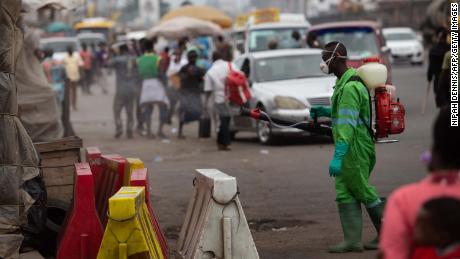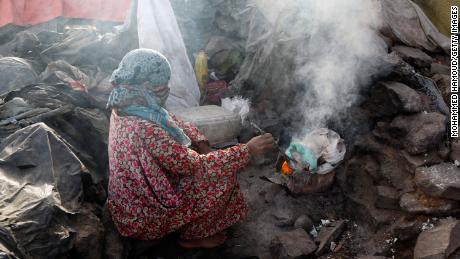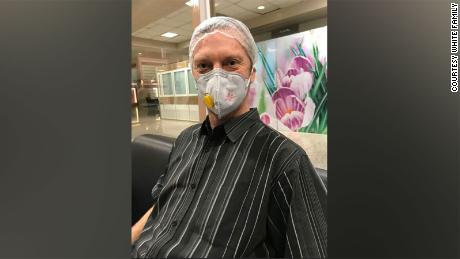Nigerian officials told Nkengasong, the Director of the Africa Centres for Disease Control and Prevention (CDC), that a recently arrived Italian businessman had tested positive for Covid-19. He later recovered. But the force of infection, mostly coming from Europe, seeded the virus in countries throughout the continent, say health officials.As imported cases increased, and community transmission began, the World Health Organization began sounding the alarm in press conferences and statements about an unfolding crisis on the continent. They said Covid-19 patients could quickly overwhelm the weak health infrastructure. Melinda Gates, in an interview with CNN, went even further in April — predicting that there would be bodies on the streets.CDC Africa and WHO officials say that the warnings were important. Very little was, and still is, known about Covid-19 and nations needed to urgently prepare. But nearly five months on, across Africa, those catastrophic scenarios just haven't happened. "The countries in the Africa region are not where they had predicted they would be by now. I think a lot of earlier predictions had painted a picture that by this time it would be quite overwhelming," said Dr. Humphrey Karamagi, the leader of the WHO Africa region's data, analytics and knowledge team. Why it didn't happen, and whether the worst still could happen, is one of the most consequential public health questions facing officials on the continent at this stage of the pandemic.
Winning the early battle
One thing that does seem certain, says Nkengasong, is that many African leaders got it right in the early stages of the fight."The leadership on the continent was extraordinary in responding in a coordinated way," he said. He says the swift action by many African leaders to close down their economies should get significant credit for slowing community spread in the early months. South Africa led the way by closing its borders to high risk travelers and shutting its schools in mid-March before reaching 100 confirmed cases. A strict lockdown swiftly followed. Health experts say that these tough decisions, and the long experience dealing with diseases like Ebola and yellow fever, made a significant impact on transmission rates.But Karamagi and a group of leading African scientists now believe that socio-ecological factors, the complex way that humans and their environment interact, could be playing an important role."We are expecting that the rate of transmission in Africa is lower. It could take a longer time to get to people who are susceptible. And the deaths, the severity of the outbreak will be less severe than we have seen in other countries," he said.
Health experts say that these tough decisions, and the long experience dealing with diseases like Ebola and yellow fever, made a significant impact on transmission rates.But Karamagi and a group of leading African scientists now believe that socio-ecological factors, the complex way that humans and their environment interact, could be playing an important role."We are expecting that the rate of transmission in Africa is lower. It could take a longer time to get to people who are susceptible. And the deaths, the severity of the outbreak will be less severe than we have seen in other countries," he said.
Not one thing, but many
Karamagi's team bases that assessment on disease modelling published in late May in the open source journal BMJ Global Health. Their modeling assumes no significant health measures by governments and plugs in the known characteristics of the SARS-CoV-2 virus and multiple factors known to affect respiratory viral transmission.One key factors, say the authors, is the relative population movements across the continent. With sparse road networks and largely rural populations in some regions, the virus may have fewer opportunities to travel.Climactic factors, like weather and precipitation, also can impact the viral spread, according to the modelling.One clear advantage across the continent, say public health experts, is based on the makeup of the population itself. More than 70% of people living in sub-Saharan Africa are under 30, and on other continents, Covid-19 has had more severe effects on the elderly.  Karamagi also says that the lower rates on the continent of what he calls 'lifestyle' conditions such as diabetes, hypertension, and obesity — important comorbidities for this coronavirus — should lead to fewer severe cases in many countries.But Covid-19 is a confounding virus. Japan, for example, has one of the world's oldest populations and hasn't seen the devastating deaths of the United States or Italy. Brazil is hot and wet, and it is now the epicenter of the disease."It is not a single factor. It is how these factors work together to create a pattern that we see in a country. We created this model to understand this," said Karamagi.
Karamagi also says that the lower rates on the continent of what he calls 'lifestyle' conditions such as diabetes, hypertension, and obesity — important comorbidities for this coronavirus — should lead to fewer severe cases in many countries.But Covid-19 is a confounding virus. Japan, for example, has one of the world's oldest populations and hasn't seen the devastating deaths of the United States or Italy. Brazil is hot and wet, and it is now the epicenter of the disease."It is not a single factor. It is how these factors work together to create a pattern that we see in a country. We created this model to understand this," said Karamagi.
An accelerating burden
Last week, the WHO announced that the overall number of confirmed cases in Africa had doubled in less than 20 days, to more than 200,000 infections — still less than 3% of the global total. But it is unclear just how many cases there really are because of inadequate testing rates.Nkengasong said that the Africa CDC's member states have only conducted about a quarter of the number of tests needed to stay ahead of the virus."This virus took everyone by surprise, and everyone was affected, so the competition for diagnostics has been acute," he said.  There have been indications of hotspots, like the rise of unexplained deaths in Kano, in northeast Nigeria, where the health minister recently admitted that more than half of April's unexplained deaths were due to Covid-19.But even as the Africa CDC works with countries to increase testing capacity and hotspots in urban centers emerge, WHO officials say there is little evidence yet of an exponential surge in severe cases, or a surge in deaths across much of the continent. They have said much of the continent will see a 'smoldering' outbreak."We believe that large numbers of severe cases and deaths are not being missed in Africa," said WHO Africa director Dr. Matshidiso Moeti at a press conference in Brazzaville, though she added that case counts can be expected to continue to rise."UntilRead More – Source
There have been indications of hotspots, like the rise of unexplained deaths in Kano, in northeast Nigeria, where the health minister recently admitted that more than half of April's unexplained deaths were due to Covid-19.But even as the Africa CDC works with countries to increase testing capacity and hotspots in urban centers emerge, WHO officials say there is little evidence yet of an exponential surge in severe cases, or a surge in deaths across much of the continent. They have said much of the continent will see a 'smoldering' outbreak."We believe that large numbers of severe cases and deaths are not being missed in Africa," said WHO Africa director Dr. Matshidiso Moeti at a press conference in Brazzaville, though she added that case counts can be expected to continue to rise."UntilRead More – Source
[contf]
[contfnew]

cnn
[contfnewc]
[contfnewc]








